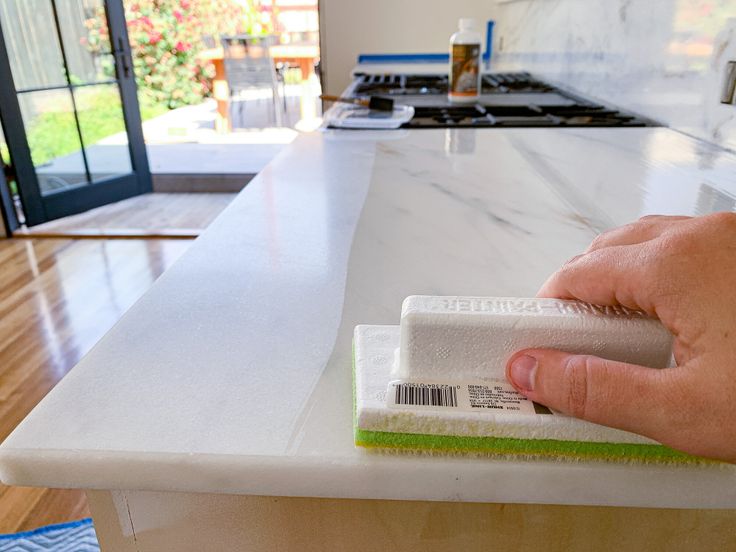Marble, a natural stone celebrated for its elegance and beauty, is often the material of choice for headstones. Its unique veining patterns and subtle colour variations lend each piece an individual character, making it more than just a grave marker.
While marble’s robustness and durability make it suitable for outdoor use, it does have certain characteristics that can make it vulnerable to the elements. One of these is its porosity. Being a porous material, marble has the capacity to absorb water.
This characteristic, while contributing to its unique texture and aesthetic appeal, also makes it susceptible to staining and erosion over time. Environmental factors such as rain, snow, and even air pollution can exacerbate these effects.
Water can seep into the tiny pores of the marble, potentially leading to discoloration or structural damage. Even dust and dirt, when allowed to accumulate, can scratch the marble and dull its shine.
This is why marble headstones require regular cleaning and maintenance. Regular care not only keeps them looking their best but also helps protect them against weathering and environmental damage.
In this comprehensive guide, we’ll delve deeper into the process of marble restoration. We’ll focus specifically on how to clean a marble headstone effectively, providing you with practical steps and expert tips to help you keep your headstone in the best possible condition.
Understanding Marble and Its Characteristics
Before diving into the cleaning process, it’s crucial to understand the nature of marble. Here are some incredible characteristics of marble that everyone should know while dealing with it:
- Metamorphic Rock: Marble is a type of metamorphic rock that originates from limestone. It has been subjected to intense heat and pressure over millions of years, transforming it into the elegant stone we know today.
- Unique Aesthetics: The natural process that forms marble results in a diverse range of colours and patterns. This variety makes each piece of marble unique, contributing to its widespread use in decorative applications.
- Porous Nature: Marble is porous, meaning it has tiny holes that allow it to absorb liquids. While this characteristic can enhance the stone’s texture and aesthetic appeal, it also makes it prone to staining.
- Susceptible to Weathering: The porosity of marble, coupled with its outdoor use, can lead to weathering over time. Elements like rain, snow, and pollution can accelerate this process.
- Requires Regular Maintenance: Due to its porous nature, marble requires regular and careful maintenance. This is especially important for marble headstones, which are continuously exposed to outdoor elements.
The Importance of Regular Marble Cleaning
Beyond maintaining the aesthetic appeal of marble, regular cleaning also prevents long-term damage. Over time, dirt, lichens, moss, and bird droppings can accumulate on the surface.
If left untreated, these substances can penetrate the marble’s pores, causing permanent stains and structural damage. Moreover, marble headstones are often located in cemeteries where they are exposed to the elements.
Rain, snow, and even air pollution can all contribute to the marble’s degradation over time. Therefore, a regular cleaning schedule is not only a matter of respect but also an essential part of preserving the headstone for future generations.
Necessary Equipment for Marble Stone Restoration
Cleaning a headstone requires some basic tools. Here’s what you’ll need:
- Non-ionic soap: This type of soap is gentle on marble surfaces and helps lift dirt without causing damage.
- Water: Preferably distilled or deionized water to avoid leaving mineral deposits on the marble.
- Soft bristle brush or microfiber cloth: These tools are gentle enough to clean without scratching the marble.
- Lint-free cloth: For drying the headstone after cleaning.
- Bucket: To mix your cleaning solution and carry water.
- Gloves: To protect your hands during the cleaning process.
Step-by-Step Guide to Cleaning a Marble Headstone
With your materials gathered, you’re ready to begin the marble cleaning process. Here’s a step-by-step guide to help you through it:
-
Step 1: Preparation
Start by removing any loose debris from the headstone. This can be done with a soft brush or cloth. Be gentle to avoid scratching the marble. Once the loose debris is removed, wet the marble headstone with clean water. This initial rinse will help remove surface dirt and prepare the stone for deeper cleaning.
-
Step 2: Mixing Your Cleaning Solution
In a bucket, mix one tablespoon of non-ionic soap with one gallon of water. Stir until the soap is fully dissolved. Non-ionic soaps are recommended because they are pH neutral, which means they won’t react with the marble and cause etching or discoloration.
-
Step 3: Cleaning the Marble Headstone
Dip your soft bristle brush or microfiber cloth into the cleaning solution and gently scrub the surface of the headstone. Work from the bottom up to prevent dirty water from dripping down onto clean areas, which can cause streaking. Pay special attention to carved details and lettering, where dirt and debris can easily accumulate.
-
Step 4: Rinsing and Drying
After you’ve thoroughly cleaned the headstone, rinse it with clean water. Make sure to remove all soap residue, as it can attract more dirt if left on the surface. Finally, dry the marble headstone with a lint-free cloth to prevent water spots from forming.
Expert Tips for Proper Marble Restoration
Marble restoration involves more than just cleaning. It’s about preserving and enhancing the stone’s natural beauty. Here are some expert tips to help you maintain a marble headstone:
- Avoid Harsh Chemicals: Acidic cleaners, such as vinegar, bleach, or lemon juice, can damage marble. Stick to pH-neutral cleaners to avoid etching or discoloration.
- Use Gentle Tools: Avoid using abrasive tools like wire brushes or scouring pads, as they can scratch the marble. Instead, opt for soft brushes or clothes.
- Clean Regularly: Regular cleaning can prevent the buildup of stubborn stains and biological growths like lichens or moss. It can also make each cleaning session less labour-intensive.
Conclusion
Cleaning a marble headstone may seem like a daunting task, but with the right knowledge and tools, it’s a manageable process. Regular maintenance, using the correct cleaning solutions and techniques, can prolong the life of the marble and keep it looking its best for years to come.
Remember, marble restoration isn’t just about preserving a monument; it’s about honouring a memory. With care and respect, these beautiful markers can stand the test of time, serving as lasting tributes to those we hold dear.
FAQ’s
What’s the best way to clean a headstone?
Use only soft brushes and gentle cleaners like water or a non-ionic cleaner with a neutral pH of 7. Avoid wire brushes, power washers, or harsh cleaners such as bleach.
How to restore a marble headstone?
For maintaining white marble headstones, clean with a sponge, pumice, bristle fiber, or nylon brush using clean water. Avoid high-pressure cleaning; opt for sprayed water instead. Never use soap, cleaning solutions, bleach, or chemicals on marble headstones.
How do you clean a granite headstone without causing damage?
Safely clean a granite headstone using natural or distilled water. Keep the stone wet throughout by using a bucket with plenty of water. For polished or honed granite memorial stones, gently wash them with a soft, damp cloth.
How to naturally clean a marble headstone?
Marble headstones should only be cleaned using water and a lint-free cloth. Marble, being porous like all natural stones, allows air and moisture to pass through its tiny pores.






